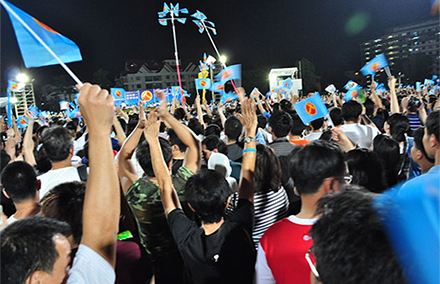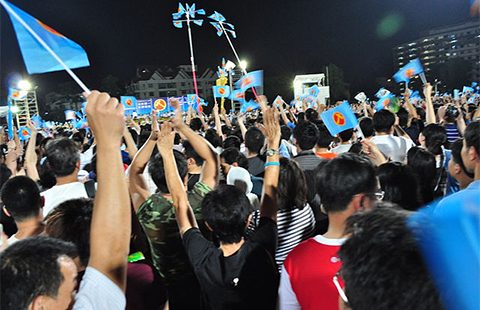
Supporters at a rally for Singapore’s opposition Workers’ Party. Photo: Abdul Rahman/ Wikimedia commons.
Opposition woes, social media and voters’ dilemmas set to shape short election campaign.
Singapore’s 2015 General Elections (GE2015) will see all the island nation’s constituencies contested for the first time since independence in 1965.
Constituencies in Singapore are electoral divisions that may be represented by single or multiple seats in parliament. This unprecedented development reflects several trends in Singapore’s politics since the 2011 election.
First, there has been a proliferation of new opposition political parties. The Workers’ Party’s (WP) victory in Aljunied Group Representative Constituency (GRC) in 2011 as well as its victories in subsequent by-elections have emboldened envious long-time opponents of the ruling People’s Action Party (PAP).
Unwilling to work their own way up the hierarchy of existing opposition parties to be nominated as a candidate, many of them have organised their own party vehicles to pursue their electoral ambitions.
Second, these new, and old, opposition parties hope to tap into the perceived discontent still simmering amongs Singaporeans about the PAP’s past policy mistakes. In particular, PAP’s liberal immigration policies continue to irk many voters.
In a recent seminar organized by the National University of Singapore Society, almost all the opposition party representatives present attacked the PAP’s highly unpopular 2013 White Paper on Population. A member of the audience openly mocked PAP’s representative Sim Ann, when she tried to explain the government’s stance on the paper.
To arrest the negative consequences of Singapore’s rapidly aging population, the White Paper specifically targeted a population of 6.9 million in Singapore by 2030. Singapore’s current population is about 5.5 million people.
Third, and most importantly, the fact that all constituencies are being contested speaks to the ability of the opposition political parties to coordinate the distribution of their candidates to ensure straight fights with the incumbent PAP in each constituency.
By avoiding the splitting of opposition votes, their vote share in each constituency is maximized. This overall coordination was a result of much horse-trading between opposition political parties in two separate meetings in early August when the electoral boundaries were initially announced.
This time, only three single member constituencies (SMC) will see three-cornered fights – Bukit Batok SMC, Radin Mas SMC, and MacPherson SMC.
So what should we look out for in the very short campaign period between nomination day (which closed Tuesday) and polling day on 11 September? There are two obvious issues – the WP’s municipal woes, and online/social media.
In the run-up to Nomination Day, the WP’s local municipal management capabilities in Aljunied GRC have come under repeated attack by the PAP. The ruling PAP has accused the WP of “overpaying” its managing agent thereby benefiting its “friends,” and of general financial mismanagement.
More recently, the PAP has leveraged control over the state bureaucracy and mainstream media to launch its attacks. The Ministry of National Development accused the managing agent of “gross profiteering.” An article in local tabloid The New Paper with no by-line leaked the fact that the managing agent was actually initiating legal proceedings against WP’s town council.
There are a number of reasons why the PAP appears intent to focus on WP’s municipal failings as part of its broader strategy. In the first instance, the PAP knows and acknowledges that the WP’s performance in parliament has been relatively reasonable to any neutral observer. Probing questions have been asked of the ruling government at relatively high frequencies. From data painstakingly collected by The Middle Ground, it is useful to note that WP parliamentarians have the highest attendance rates and spoke the most number of times in parliament.
Moreover, focus on municipal management will not only hurt the WP in its existing constituencies where it has already won; it will also sow doubt in the minds of voters whom the WP wishes to court. The residents of Fengshan, East Coast, and Sengkang West are likely to think twice about voting for the WP, even if they may be sympathetic towards the opposition’s overall cause.
Since 2011, online media and social media has also taken a much more important role in determining how these campaign punches and counter-punches have played out. There has been a proliferation of new platforms that package news in innovative ways for young Singaporeans with little time on their hands.
Mothership’s unique mix of bite-size news and medium-length commentaries is akin to Buzzfeed or Mashable. It has gained much credit for scoring exclusive interviews with numerous personalities, such as Kahar Hassan, a potential PAP candidate who was replaced at the last minute. The Middle Ground, fronted by former journalist Bertha Henson, has covered almost all of the press conferences of potential candidates in the elections thus far. Other notable sites include Inconvenient Questions as well as the veteran The Online Citizen.
As much as these platforms provide news that people can consume, they are also the platforms where news and sound bites go viral. In the Punggol East by-election in 2013, the turning point came when a video clip of the PAP candidate Dr Koh Poh Koon went viral. His remarks that “everybody has a car” was the death nail in his campaign as it demonstrated how he was so out of touch. Don’t be surprised if there is a similar moment in GE2015.
Ultimately, we should not forget the multiple dilemmas that confront Singaporean voters.
On the one hand, voters may reasonably trust in the continued success of the PAP, Singapore’s ruling party since 1959, in providing social stability and economic growth. On the other hand, voters may desire for more opposition parliamentarians to ask probing questions concerning existing and future public policies.
At the same time, those inclined to vote for the opposition may also legitimately express scepticism over the qualities of opposition candidates.
We shall see how voters resolve their dilemmas over the next 10 days.
Elvin Ong is a PhD graduate student in the Department of Political Science at Emory University. He can be reached at [email protected].
 Facebook
Facebook  Twitter
Twitter  Soundcloud
Soundcloud  Youtube
Youtube  Rss
Rss 